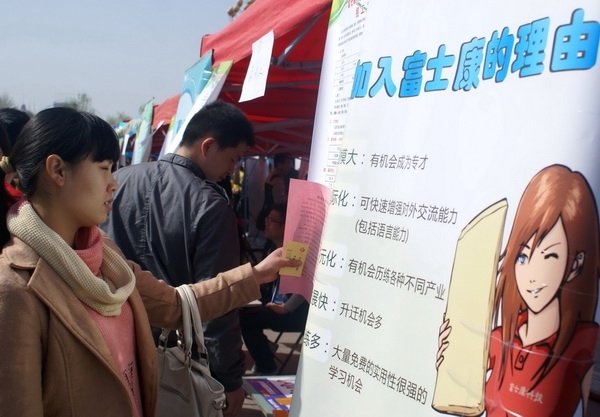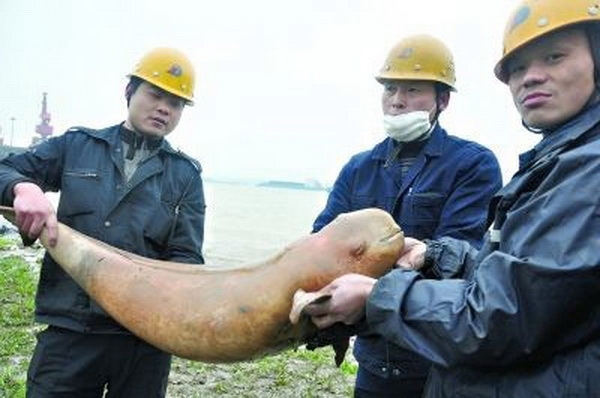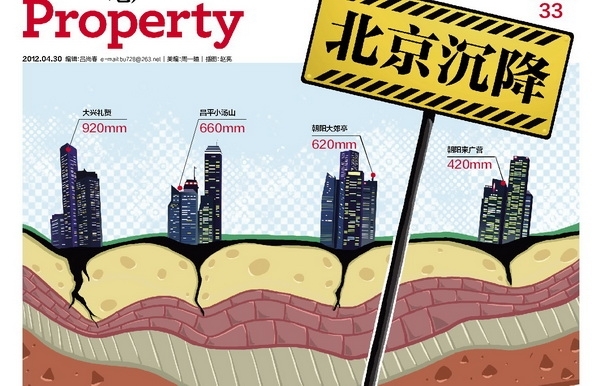

Highlights from the EO print edition, No. 567, Apr 30, 2012

Sichuan Government Acts as Foxconn's HR Department
News, cover
~ Civil servants in Chengdu are being forced to help Foxconn meet recruitment targets for a factory that it opened two years ago in the Sichuan capital.
~ One government employee, a twenty-six year-old woman who asked not to be named, was even sent herself to work for a month at the Foxconn factory because she had failed to fulfil her quota of recruitments for the Taiwanese manufacturer.
~ Foxconn's factory, the largest investment so far in western China, makes two thirds of the world's iPads - the firm was lured to the region with preferential taxes and land leases. The incentives from the government also included a pledge to help recruit workers for the production line.
~ "Foxconn only needs to tell the Sichuan provincial labor department how many workers are needed ... they'll continuously recruit new staff to the factory," said an administrative employee from Foxconn's Shenzhen headquarters.
~ At its busiest time, the Chengdu site had 120,000 employees, but the size of the workforce fell to 90,000 in October 2011 and is currently around 60,000 people.
~ Whenever there is a worker shortage, the Foxconn human resources department puts pressure on the government. "The government has to meet their promise, otherwise we can withdraw our investment," said a Foxconn manager.
~ The provision of government services to citizens has even been linked to Foxconn's requirements - a villager of Yibin County (宜宾县) told the EO, "the [local] government said, if no relatives from a household go to work at Foxconn, then 1,000 yuan will be deducted from the 10,000 yuan subsidy for refurbishing dilapidated buildings"
Original article: [Chinese]
Small Returns on China's Large Foreign Holdings
News, cover
~ Not only is the Peoples' Bank of China the largest central bank in the world in terms of assets held, but China also manages the world's largest foreign exchanges reserve, much of which is invested in low-yielding U.S. treasury bonds.
~ Despite these large holdings, China has not been able to get much in the way of returns, with foreign investment in China earning more than Chinese investment abroad.
~ The return on China's investment abroad totaled $128 billion last year, but foreign firms gained $154.9 billion from their investments in China, a net loss of $26.8 billion - the largest in almost 20 years, according to data released by the State Administration of Foreign Exchange (SAFE).
~ Sources close to SAFE also told the EO, that efforts to ease current restrictions on investing abroad which would allow more private and commercial investments to be made has run into obstacles and has not kept pace with the opening up of the QFII and RQFII programns which allow foreign institutional investors to invest in China.
~ In response to the EO's report, Guan Tao, head of the international balance of payments department at China's State Administration of Foreign Exchange, explained that China had recorded gains in the country's outbound investment every year and its outbound investment gains increased at an average annual rate of 32 percent between 2004 and 2011.
~ In a statement posted to SAFE's website, Guan Tao also noted that, "We couldn't conclude that China's outbound investment made losses just because the data from the international balance sheet showed a negative return on China's investment."
~ He also said that the country's foreign assets didn't shrink in value last year, with an increase of $86.7 billion from the end of 2010.
~ Net foreign assets totaled US$1.77 trillion last year.
~ China held $1.18 trillion worth of US treasury bonds, as of the end of February, up $12.7 billion on January, the US Treasury Department said in a report last week.
Original article: [Chinese]
Finance Ministry an Obstacle to SASAC's Ambitions for Control of SOEs
News, page 2
~ The State-owned Asset Supervision and Administration Committee (SASAC) is considering taking control of all the country's profit-driven state-owned enterprises (SOEs), but that plan may run up against the Ministry of Finance, which wants separate supervisory bodies for businesses owned by certain departments, such as the Ministry of Culture.
~ The Ministry of Education is also about to form its own team to supervise and administer the SOEs under its control.
~ Right now, 5,000 profit-driven SOEs are out of SASAC's reach, answering instead to various ministerial agencies.
~ However, SASAC hasn't given up, one insider told the EO, although it is prepared to give the finance ministry control of the public-interest-driven SOEs.
~ It is also negotiating with the Ministry of Finance for the right to set SOEs' budgets – currently this is the ministry's role.
~ SASAC is also angling for a change in the way that SOEs profits are spent to allow greater flexibility between industries.
Original article: [Chinese]
Environment Law Diluted and Delayed
News, page 3
~ The long-waited amendments to China's Law of Environmental Protection might not be implemented this year because the Environment and Resources Protection Committee (EPRC) wants to water down clauses that would restrict local governments.
~ The original version had included a standard system to evaluate local government's policies for environmental protection, but this was removed by ERPC, which is a regulatory body under the National People's Congress (NPC).
~ Another deleted clause concerns companies that are responsible for pollution but refuse to settle within a defined period. The clause had imposed on these companies a daily fine, whose amount rose over time.
~ The draft law was supposed be reviewed by the NPC's standing committee in the first half of this year, but heated debate between experts and lawmakers means that this deadline will be missed.
~ Clauses protecting citizen's rights to information on the environment have also been removed from the proposed law.
~ The Law of Environmental Protection in its current form was implemented in 1989 and is viewed as the weakest law in China because of local governments' fixation with economic growth ahead of the environment.
~ Pollution scandals have been the focus of numerous major news stories in China over recent years. The pollution caused by Zijin Mining Group to nearby villages and lakes, the oil spill in the Bohai sea and the water pollution in Peijiang River, Sichuan Province, are just a few examples.
Original article: [Chinese]
Special Feature: Reforming China's Public Institutions
Nation, page 9-10
~ In mid-April China's State Council published a document that mapped out the way ahead for a major reform of the country's "public institutions," the reform will potentially effect the employment conditions of 30 million workers who are currently employed in these kind of quasi-public service positions. In this week's paper, we look at what the reforms mean for public sector employees in Beijing, Shenzhen and Shanghai.
Original article: Beijing [Chinese], Shenzhen[Chinese] and Shanghai [Chinese]
Chongqing's Red TV Faces up to Market Forces
Nation, page 12
~ Chongqing satellite television is again competing for ratings and trying to win younger viewers as it resumes advertising sales after a three-year break that began while Bo Xilai served as the party head of the southwestern municipality.
~ The network takes payments for product placement in TV shows, and staff are optimistic that commercial advertisements will be launched soon.
~ Liu Guangquan, president of Chongqing Broadcasting and Television Group, admitted that the local media giant was facing pressure from public opinion as well as severe financial problems.
~ The Chongqing satellite network used to generate 300 million yuan each year from advertising sales but then it started a movement called "Red China" in 2009. The channel themed its programs for "common values and noble tastes" and took soap operas off air and banned commercials.
~ Though the Chongqing government has paid subsidies of 150 million yuan per year to the station, the network has still struggled to cover its programming and transmission costs.
Original article: [Chinese]

China's Endangered "River Pig"
Nation, page 13
~ The Yangtze finless porpoise (江豚), commonly known as the "river pig" by local people on account of its less-than-stunning looks, is a unique freshwater porpoise subspecies that inhabits the Yangtze River and nearby lakes.
~ Since early March, some 12 of these porpoises, classified as a second-level protected animal in China, have been found dead around the Dongting Lake Basin area in China's central Hunan Province.
~ After three consecutive years of field investigations by the World Wildlife Fund (WWF) and the Institute of Hydrobiology of the Chinese Academy of Sciences, it has been found that there are all together only about 1,500 of the finless porpoises remaining.
~ Wei Baoyu (韦宝玉), the project leader of the WWF in Hunan Province said the main threats facing the porpoises were - ever scarcer food resources, water pollution and dredging that destroys the riverbed where the river dolphins reproduce.
Original article: [Chinese]

Beijing is Sinking!
Property, page 33
~ Land subsidence is becoming a growing problem for Beijing, with one-third of the surface area in the greater Beijing plain area showing signs of significant land subsidence.
~ By 2010, the total area of land in the capital which had sank more than 20 cm reached 2,475 square kilometers.
~ "The main reason for land sinking in North China Plain region is the over-exploitation of groundwater" a senior researcher from the China Institute of Water Resources and Hydropower Research told the EO.
~ In terms of hot spots, experts say that Lixian (礼贤) in Daxing District, Xiaotangshan (小汤山) in Changping District, Dajiaoting (大郊亭)and Laiguangying (来广营) in Chaoyang District are all likely to be areas that will sink by about one meter by 2020.
~ And in these areas, there are quite a few real estate projects. The future land sinking issue should be taken into consideration for developing these property projects.
~ A person in charge of a well-known property development enterprise which is working on a property project in the Dajiaoting area explained to the EO that due to the potential risks posed by land subsidence, the company had to complete a geological survey before going ahead with the development.
Original article: [Chinese]

